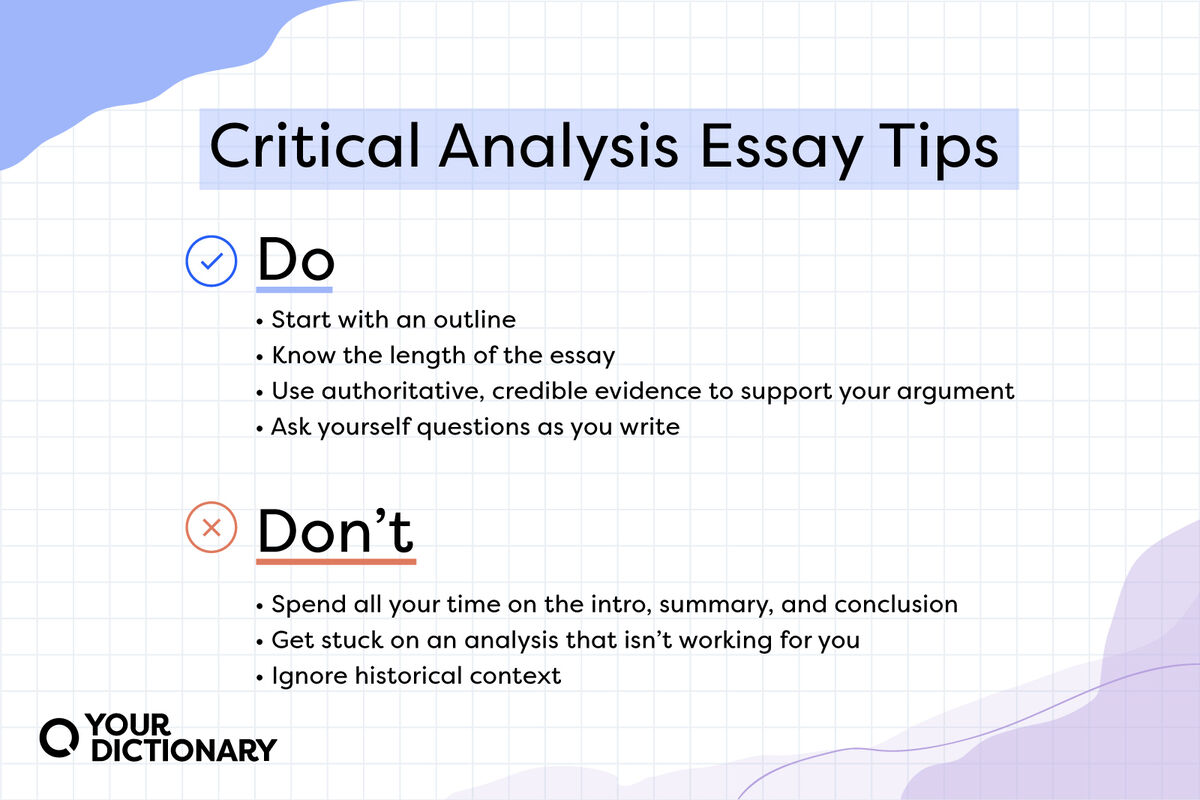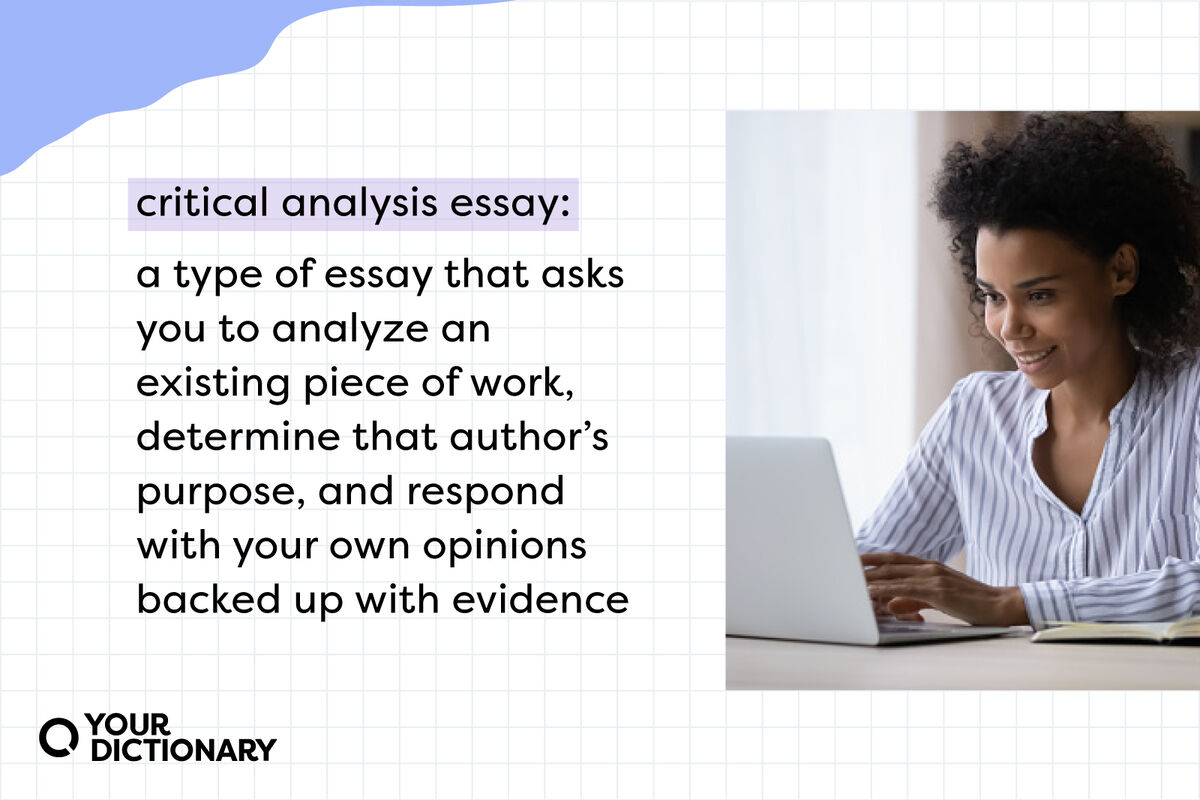
If you take any sort of writing class, you’ll almost certainly have to write a critical analysis essay. Critical analysis essays require you to look at a piece of art or media, evaluate what it’s saying or arguing, and use that to develop your own arguments and ideas about that piece. It takes a lot of critical thinking, but with a little preparation and practice, you’ll be critically analyzing with the best of them.
Know the Length of Your Critical Analysis Essay
There is no singular length for a critical analysis essay. Some critical analysis essays are about 500 words long (about two pages double-spaced in 12 pt. Times New Roman). Others might be closer to 1,200 words, which is about six to eight pages. If you’re looking at a higher level critical analysis paper in a college literature class, you could be looking at an essay that’s upwards of 20 to 25 pages.
Ultimately, check your syllabus, or ask your teacher specifically about any word or page requirements.
Start With an Outline To Format Your Essay
An essay outline helps you organize your thoughts and identify your essay’s format. If you diverge from your outline later on, it’s totally fine, but you should get your thoughts on the page and planned out in a cohesive way.
On the shorter end of things, a critical analysis essay will include:
- Introduction: A paragraph that broadly introduces your themes, hooks readers, and states your thesis
- Summary: A paragraph (sometimes more, sometimes not required) that succinctly summarizes the work you are analyzing
- Body paragraphs: Two to four body paragraphs going deeper into the analysis of the piece
- Conclusion: A paragraph that restates your thesis and considers questions you might not have directly addressed in your essay
That adds up to five to seven paragraphs total, though even that comes with some wiggle room. Some instructors might combine the summary into the intro, while others might do away with it entirely.
On the longer end of things, you’ll have more body paragraphs with more evidence and analysis.
Make Sure You Understand What “Critical” Means
Most people translate critical thought and critical analysis as “stating whether something is good or bad.” That’s definitely a part of it, but critical analysis is more than just a thumbs up or thumbs down.

A critical analysis involves:
- A deconstruction of a text
- An evaluation of the distinct components of that text
- An evaluation of the authorial intent or thesis
- Any outside context, background, or bias that could influence the authorial intent
And that’s just a small fraction of what it could involve. Things get even more complex when you consider different forms and genres.
For now, the basic things to ask yourself to get started are:
- What do you think the text is trying to say?
- How do the various parts of the text work to get that point across?
- Do you agree or disagree with the text? Why or why not?
Spend More Time on the Critical Analysis
You should spend the majority of your time building out the body paragraphs with your critical analysis. Don’t spend hours agonizing over your introduction, summary, or conclusion.
In fact, aside from writing a basic thesis, leave your intro and conclusion. A lot of what you say in your critical analysis will help feed those other components.
Use Authoritative Sources To Back Up Your Ideas
As extremely knowledgeable and well-versed as you might be, most teachers and instructors also want to see you use evidence from other sources to back up your ideas and main argument. Finding authoritative and credible sources can get tricky here, but it can include similar texts, scholarly articles, and journalistic pieces.
The good news: You probably already have some sources you can turn to that are within arm’s reach. Use texts that have been discussed in class in relation to the text that you’re critically analyzing. If all else fails, most instructors are happy to at least point you in the right direction.
When In Doubt, Turn to Context
Nothing exists in a vacuum. External factors affect everything. Looking at the immediate context around a text is an easy way to discover things that potentially influenced that text or even give insight into why that thing was published.
For example, some questions you should consider include:
- What political or global events were happening when the text was published?
- Was the text or subject a direct response to a specific piece of art or media?
- Is the piece working within a specific theory or tradition? Is it in conversation with that tradition or diverging from it?
Allow Your Critical Analysis To Change
You obviously shouldn’t get too wishy-washy to the point where you get nothing done. However, if you are in the middle of your critical analysis and think, “Wait, I think this other angle will work better,” by all means, let yourself change things around. Don’t stubbornly pursue a thesis that you can’t make sense of or continue digging into one component of the text that turns out to be a dead end.
For example, if you’ve been writing your essay about a character’s ideologies and find yourself going nowhere, think about how other characters might exhibit similar themes. Look at specific language that proves or (even better) complicates those ideologies.
Ask Yourself Questions To Come Up With a Topic
One of the hardest parts about writing a critical analysis essay is deciding what to even write in the first place. We can’t choose a specific topic or thesis for you, but we can give you some questions to get your noodle thinking.
- What is the author trying to say through their work? Are they successful in what they’re arguing?
- Consider another text or work that you have interacted with in class. Is there something — a character, a setting, an attitude — that connects the two?
- Does the work directly state a position on a specific politic? Does it continue to support that stance throughout the work?
- How does a character change over the course of a work?
- Does the author present a conclusion that is different from what they were trying to say earlier in the work?
- Does the work acknowledge the opposing view? Does it ignore or even undermine the opposing viewpoint?
- Does the author have a background that could influence the main argument of the work?
- Is there specific language or word choices that skew or betray the ideas in the work?
Now that you’re armed with the right tips, you can write a killer critical analysis essay that has your professor begging you for more.